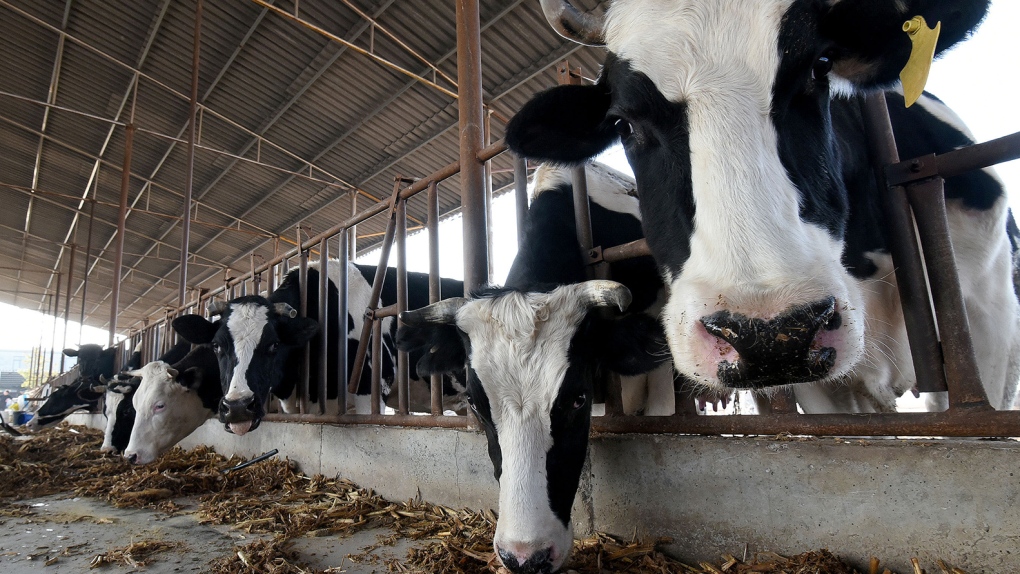
LIVE UPDATES Rain reduces wildfire activity, aids firefighters: Jasper park officials
Jasper National Park officials said Thursday night that rain over the day resulted in "minimal fire behaviour and spread."
Chinese scientists have successfully cloned three "super cows" that can produce an unusually high amount of milk, state media reported, hailing it as a breakthrough for China's dairy industry to reduce its dependence on imported breeds.
The three calves, bred by scientists from the Northwest University of Agricultural and Forestry Science and Technology, were born in the Ningxia region in the weeks leading up to the Lunar New Year on January 23, the state-run Ningxia Daily reported.
They were cloned from highly productive cows from the Holstein Friesian breed, which originated in the Netherlands. The chosen animals are capable of producing 18 tons of milk per year, or 100 tons of milk in their lifetimes.
That is nearly 1.7 times the amount of milk an average cow in the United States produced in 2021, according to the U.S. Department of Agriculture.
The first of the cloned calves was born on December 30 by cesarean section due to its relatively large size of 56.7 kilograms (120 pounds), an official in the city of Wulin in Ningxia told the state-run Technology Daily.
The scientists made 120 cloned embryos from the ear cells of the highly productive cows and placed them in surrogate cows, according to the Technology Daily.
Jin Yaping, the project's lead scientist, called the birth of the "super cows" a "breakthrough" that allows China to preserve the very best cows "in an economically feasible way," the state-run newspaper Global Times reported.
Only five in 10,000 cows in China can produce 100 tons of milk in their lifetimes, making them a valuable resource for breeding. But some highly productive cows are not identified until the end of their lives, making it difficult to breed them, Jin said.
As much as 70% of China's dairy cows are imported from overseas, according to the Global Times.
"We plan to take two to three years to build up a herd comprised of over 1,000 super cows, as a solid foundation to tackle China's reliance on overseas dairy cows and the issue of the risk of being 'choked' [by supply chain disruptions]," Jin told the newspaper.
In many countries, including the United States, farmers breed clones with conventional animals to add desirable traits, such as high milk production or disease resistance, into the gene pool.
China has made significant progress in animal cloning in recent years.
Last year, a Chinese animal cloning company created the world's first cloned Arctic wolf.
In 2017, Chinese scientists said they produced cloned cattle with increased resistance to bovine tuberculosis, a risk to cattle in many countries.

Jasper National Park officials said Thursday night that rain over the day resulted in "minimal fire behaviour and spread."
The Canadian Olympic Committee has removed women's national soccer team head coach Bev Priestman over a drone scandal, according to a press release from the organization.
A woman in Yukon believes her hair clip helped save her during a bear attack.
Newly released financial reports show that William, the Prince of Wales, drew a salary of $42.1 million last fiscal year, his first since inheriting the vast and lucrative Duchy of Cornwall.
On Wednesday night, the owner of Maligne Lodge in Jasper, Alta., was shocked to receive a photo of her business engulfed in flames.
The Law Society of British Columbia says a DNA test shows a former judge and Order of Canada recipient accused of falsely claiming to be Cree "most likely" has Indigenous heritage.
Ismael 'El Mayo' Zambada, a historic leader of Mexico's Sinaloa cartel, and Joaquin Guzman Lopez, a son of another infamous cartel leader, were arrested by U.S. authorities in Texas on Thursday, the U.S. Justice Department said.
U.S. Vice President Kamala Harris pressured Israeli Prime Minister Benjamin Netanyahu on Thursday to help reach a Gaza ceasefire deal that would ease the suffering of Palestinian civilians, striking a tougher tone than President Joe Biden.
As fire threatened people in Jasper National Park, Colleen Knull sprung into action.

A Saskatchewan-born veteran of the Second World War was recently presented with France's highest national order.
A local First Nations elder and veteran is helping to bring the Ojibwe language to a well-known film for the first time.
A cat who fled her Montreal home nearly a decade ago has been reunited with her family after being found in Ottawa.
A woman in Waterloo, Ont. is out thousands of dollars for a car crash she wasn’t involved in.
A swarm of bees living in a lamppost in Winnipeg’s Sage Creek neighbourhood has found a new home for its hive.
Around 100 acres of Manitoba Crown Land near the Saskatchewan border is being returned to the Métis community.
Nova Scotia is suspending the licensed Cape Breton moose hunt for three years due to what the province is calling a “significant drop” in the population.
A well-known childhood prank known as 'nicky nicky nine doors,' or 'ding dong ditch,' has escalated into a more serious game that could lead to charges for some Surrey, B.C. teens.
It's been more than a month since their good friend was seriously hurt in an accident and two teens from Riverview, N.B., are still having a hard time dealing with it.
 Workers feed cows at a dairy farm in Handan, Hebei province, China, in November of 2021. (Hao Qunying/Costfoto/Future Publishing/Getty Images)
Workers feed cows at a dairy farm in Handan, Hebei province, China, in November of 2021. (Hao Qunying/Costfoto/Future Publishing/Getty Images)